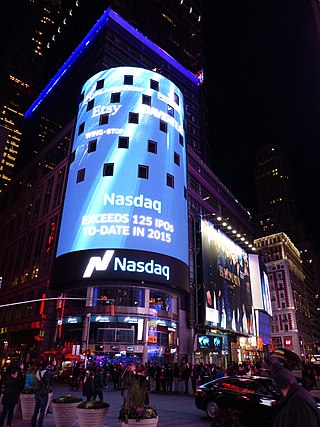Related Research Articles

Security market is a component of the wider financial market where securities can be bought and sold between subjects of the economy, on the basis of demand and supply. Security markets encompasses stock markets, bond markets and derivatives markets where prices can be determined and participants both professional and non professional can meet.

Nasdaq, Inc. is an American multinational financial services corporation that owns and operates three stock exchanges in the United States: the namesake Nasdaq stock exchange, the Philadelphia Stock Exchange, and the Boston Stock Exchange, and seven European stock exchanges: Nasdaq Copenhagen, Nasdaq Helsinki, Nasdaq Iceland, Nasdaq Riga, Nasdaq Stockholm, Nasdaq Tallinn, and Nasdaq Vilnius. It is headquartered in New York City, and its president and chief executive officer is Adena Friedman.
OTC Markets Group, Inc. is an American financial services corporation that operates a financial market providing price and liquidity information for almost 12,400 over-the-counter (OTC) securities. The group has its headquarters in New York City. OTC-traded securities are organized into three markets to inform investors of opportunities and risks: OTCQX, OTCQB and Pink.

Adaptec, Inc., was a computer storage company and remains a brand for computer storage products. The company was an independent firm from 1981 to 2010, at which point it was acquired by PMC-Sierra, which itself was later acquired by Microsemi, which itself was later acquired by Microchip Technology.

Perrigo Company plc is an American Irish-registered manufacturer of private label over-the-counter pharmaceuticals, and while 70% of Perrigo's net sales are from the U.S. healthcare system, Perrigo is legally headquartered in Ireland for tax purposes, which accounts for 0.60% of net sales. In 2013, Perrigo completed the sixth-largest US corporate tax inversion in history when it reregistered its tax status to Ireland to avoid U.S. corporate taxes. Perrigo maintains its corporate headquarters in Grand Rapids, Michigan, within Michigan State University's Grand Rapids Innovation Park.
OCZ was a brand of Toshiba that was used for some of its solid-state drives (SSDs) before they were rebranded with Toshiba. OCZ Storage Solutions was a manufacturer of SSDs based in San Jose, California, USA and was the new company formed after the sale of OCZ Technology Group's SSD assets to Toshiba Corporation. Since entering the memory market as OCZ Technology in 2002, the company has targeted its products primarily at the computer hardware enthusiast market, producing performance DDR SDRAM, video cards, USB drives, power supplies, and various cooling products. SSD devices with the OCZ brand that are using SATA III, PCI Express, Serial attached SCSI and USB 3.0 interfaces, for both client and enterprise applications are currently being produced. OCZ Storage Solutions was dissolved on April 1, 2016 and absorbed into Toshiba America Electronic Components, Inc, which later then became Kioxia.

Daiichi Sankyo Company, Limited is a global pharmaceutical company and the second-largest pharmaceutical company in Japan. It achieved JPY 1,278 billion in revenue in 2022. The company owns the American pharmaceutical company American Regent.

Intercontinental Exchange, Inc. (ICE) is an American multinational financial services company formed in 2000 that operates global financial exchanges and clearing houses and provides mortgage technology, data and listing services. Listed on the Fortune 500, S&P 500, and Russell 1000, the company owns exchanges for financial and commodity markets, and operates 12 regulated exchanges and marketplaces. This includes ICE futures exchanges in the United States, Canada, and Europe; the Liffe futures exchanges in Europe; the New York Stock Exchange; equity options exchanges; and OTC energy, credit, and equity markets.
Comscore, Inc. is an American-based global media measurement and analytics company providing marketing data and analytics to enterprises, advertising agencies, brand marketers, and publishers.
LifeScan, Inc. is a diagnostic systems manufacturer with products focusing on the diabetes market, specifically blood glucose monitoring systems.
China Medical Technologies, Inc. (CMED) was a Cayman Islands corporation based in China, currently in liquidation following fraud allegations. It purported to develop, manufacture, and market high intensity focused ultrasound therapy systems, advanced in vitro diagnostic ("IVD") products using enhanced chemiluminescence ("ECLIA") technology, fluorescent in-situ hybridization ("FISH") technology, and surface plasmon resonance (“SPR”) technology to detect and monitor various diseases and disorders.
Noninvasive glucose monitoring (NIGM), called Noninvasive continuous glucose monitoring when used as a CGM technique, is the measurement of blood glucose levels, required by people with diabetes to prevent both chronic and acute complications from the disease, without drawing blood, puncturing the skin, or causing pain or trauma. The search for a successful technique began about 1975 and has continued to the present without a clinically or commercially viable product.
Velti is a mobile marketing company offering its services to mobile operators and brands. The company was founded in 2001, went public in London in 2006 and on NASDAQ in 2011. In 2013 Blackstone, acquired the assets of Velti and the company was taken private.
Tobii Dynavox is a SE-based developer, manufacturer, and distributor of speech generating devices headquartered in Danderyd, Sweden, with offices in Pittsburgh, Norway, Germany, France, the UK, China, Japan, South Korea, and Taiwan. The company was formed in 1983 and produces speech communication devices and special education software used to assist individuals in overcoming speech, language and learning challenges.
GFI Group Inc. (GFI) through its subsidiaries provides brokerage services, trade execution, market data, trading platforms and other software products. Clients are institutional customers in markets for a range of fixed income, financial, equity and commodity instruments. GFI is headquartered in New York City and operates from New York, London, Paris, Tokyo, Hong Kong, Singapore and 15 other smaller financial centres such as Dublin, Nyon, Bogotá and Tel Aviv.
DexCom, Inc. is a company that develops, manufactures, produces, and distributes continuous glucose monitoring (CGM) systems for diabetes management. It operates internationally with headquarters in San Diego, California, and has manufacturing facilities in Mesa, Arizona and Batu Kawan, Malaysia.

Zynex, Inc. is a medical device manufacturer that produces and markets electrotherapy devices for use in pain management, physical rehabilitation, neurological diagnosis and cardiac monitoring. Thomas Sandgaard founded Zynex Medical in 1996.
Xplore Technologies is a publicly traded, designer, marketer and manufacturer of rugged tablets. The company was founded in 1996 and is based in Austin, Texas. In 2015, Xplore Technologies purchased assets of Motion Computing making it one of the top companies in the rugged tablet PC market. The company's products are primarily used by field service personnel, factory workers and military personnel. Xplore Technologies products are built to satisfy MIL-STD-810G and HAZLOC compliant ATEX standards, as well as Ingress Protection (IP) ratings.
Nayax Ltd. is a global fintech company that offers cashless, telemetry, management, monitoring, and business intelligence (BI) products and services for the vending, unattended, and other retail industries.
Nemaura Medical Inc. is a UK based Medical Technology company developing a wireless non-invasive blood glucose monitoring system called SugarBeAT.
References
- ↑ Pollack, Andrew (3 November 2002). "Companies That Seek Cures Now Fight for Life". The New York Times. Retrieved 8 November 2016.
- ↑ "Cygnus Stock Down 17% on Product Delay". LA Times. Los Angeles Times. 12 November 1996. Retrieved 8 November 2016.
- ↑ Mukhey A. No action request letter. Cygnus, INC.file no. 0-18962; request for modified exchange act reporting. 2006.
- ↑ "Cygnus, Inc. Announces That It Intends To File Certificate Of Dissolution On November 21, 2005". BioSpace. Retrieved 8 November 2016.